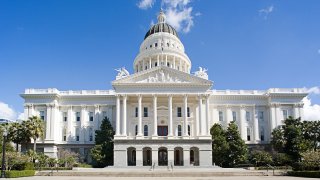
A coronavirus outbreak is closing California’s Capitol and forcing the Assembly to put off its return to work as infection and hospitalization rates soar across the state.
Assemblywoman Autumn Burke, a Democrat from Inglewood, tweeted Monday that she was exposed to COVID-19 by someone when the Assembly met on June 26 to pass a $202.1 billion budget, even though she and others were wearing masks and observing physical distancing requirements.
“Currently, my daughter and I have no symptoms, but will be remaining in quarantine until released by a doctor,” Burke tweeted.
Four other people who work in the Assembly also have tested positive for the virus, Speaker Anthony Rendon’s office confirmed without indicating whether they were lawmakers or staff.
The Speaker’s office said the Capitol building would be closed until further notice for “cleaning and sanitizing.”
The Assembly was scheduled to return to work on July 13 along with the state Senate. There was no immediate word on whether the Senate’s reentry had been postponed.
Many state legislatures shut down earlier this year as the pandemic took hold of the U.S., including California, where lawmakers missed nearly two months of work in its first unscheduled recess in 158 years. But many legislatures eventually returned to work with restrictions in place to limit the spread of the virus.
California
The delay comes as more young people are getting the coronavirus in California, fueling a surge of hospitalizations across the state and prompting Gov. Gavin Newsom’s administration to step up enforcement of new restrictions on bars and restaurants.
Statewide, coronavirus hospitalizations have increased 56% in the past two weeks while the number of confirmed cases has jumped 53%. In Los Angeles County, where one quarter of the state’s population lives, people between the ages of 18 and 40 now account for 25% of all coronavirus hospitalizations — up from about 10% in April.
“Unfortunately where we are today is different than where we were two, three or four weeks ago,” Los Angeles County Public Health Director Barbara Ferrer said.
While the state has more than 30,000 beds potentially available for new patients, the number of COVID-19 hospitalizations has steadily increased and now accounts for 8% of all hospitalizations. In Imperial County, an agricultural county that borders Mexico, hospitals have been overwhelmed and 500 patients have been transferred to other counties.
Public health officials fear many of the new cases come from close contact at recently reopened beaches, indoor restaurant dining areas, bars and similar gathering spots.
Newsom has ordered bars, indoor restaurant dining and other indoor businesses to close for the next three weeks in 23 of the state’s 58 counties.
Over the busy Independence Day weekend, Newsom’s administration deployed “strike teams” of state inspectors to enforce those rules. But the teams only issued 52 citations because most business owners complied with state directives, Newsom said.
“The overwhelming majority of people were doing the right thing,” he said. “Even if people were out of compliance, the engagement got people back into compliance very quickly.”
San Diego County, the state’s second-most populous with more than 3 million residents, was added to the list last week and announced Monday it would bar indoor dining and re-close movie theaters, card rooms, museums, bowling alleys and other family entertainment venues.
The county has seen more than 21 outbreaks of at least three people from different households, including 16 at restaurants.
There also is concern that Fourth of July dinners and barbecues with neighbors or out-of-town relatives may further spread infection, although any surge may take several weeks to show up in the statistics.
For most people, the new coronavirus causes mild or moderate symptoms, such as fever and cough that clear up in two to three weeks. For some, especially older adults and people with existing health problems, it can cause more severe illness, including pneumonia and death.
___
Associated Press reporters John Antczak and Stefanie Dazio in Los Angeles and Julie Watson in San Diego contributed to this report.



